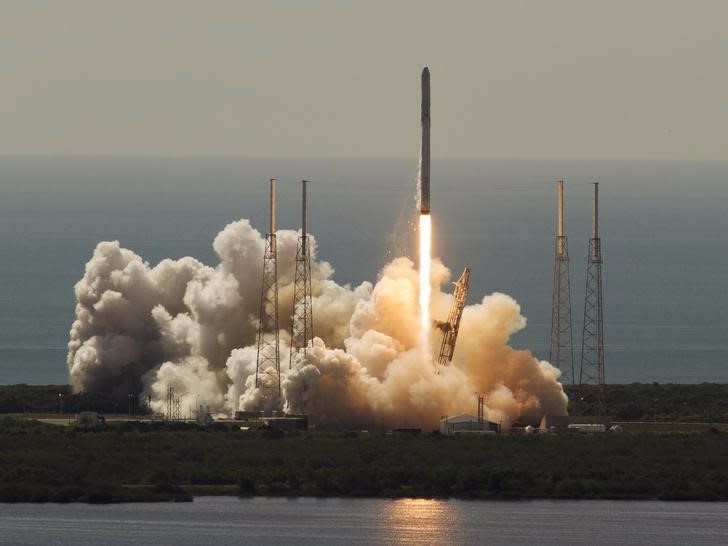SpaceX made an $82.7 million deal that just ended a 10-year monopoly in the spaceflight market

Thomson Reuters
On Wednesday, the US Air Force awarded Elon Musk's private company SpaceX an $82.7 million contract to launch a GPS satellite.
This is the first time in a decade that a company other than United Launch Alliance has been given a contract for a military space launch, loosening the tight grip it held on the market.
The contract covers production of a Falcon 9 rocket, spacecraft integration, launch operations, and spaceflight certification, Reuters reports.
Winning this contract might also give SpaceX a huge advantage in the US military spaceflight market, making it harder for ULA to compete with it for future national security launches.
Breaking a 10-year monopoly
ULA is a joint venture between Lockheed Martin and Boeing Co. It has enjoyed a monopoly on the market of ferrying national security satellites to space for the past decade.
In 2006 the alliance was awarded a contract in which the Air Force agreed to give it $800 million a year from 2006 to 2019 to launch national security satellites to space. The Air Force had not certified SpaceX rockets to conduct national security launches at that time, so the company wasn't able to compete against ULA for these missions.
But ever since SpaceX burst into the spaceflight scene with its first Falcon 9 flight in 2010, ULA's monopoly has been on shaky ground. SpaceX fought to get certification, claiming that it could launch medium-lift missions at half the price.
The Air Force finally certified SpaceX last May, and ULA responded to the new competition by not submitting a proposal for this GPS launch contract. It cited numerous reasons, one of them being an inability to compete with SpaceX's pricing.
At a Senate Armed Services Committee hearing in January, Air Force Secretary Deborah Lee James said Air Force members were investigating the repercussions of prematurely ending the contract with ULA.
SpaceX is on a roll

Thomson ReutersThe announcement of this $82.7 million contract comes just as SpaceX is basking in the glory of two successful landings of reusable rockets, all in a period of a few months.
And just Wednesday the company announced plans to send an unmanned spacecraft to Mars as soon as 2018, bringing the company one step closer to its goal of landing humans on the red planet.
The satellite, which is the second orbiter of a new generation of GPS satellites, is slated to launch in May 2018 from Florida.
"This GPS III Launch Services contract award achieves a balance between mission success, meeting operational needs, lowering launch costs, and reintroducing competition for National Security Space missions," Lt. Gen. Samuel Greaves, who leads the Air Force's Space and Missile Systems Center, said in a statement.
The Air Force plans to request bids for contracts for more satellite launches in the future, the next one being another GPS III satellite. ULA does not expect to sit out on bids for these coming launches.
NOW WATCH: Watch SpaceX pull off its most impressive rocket landing to date
See Also:

 Yahoo Finance
Yahoo Finance 
